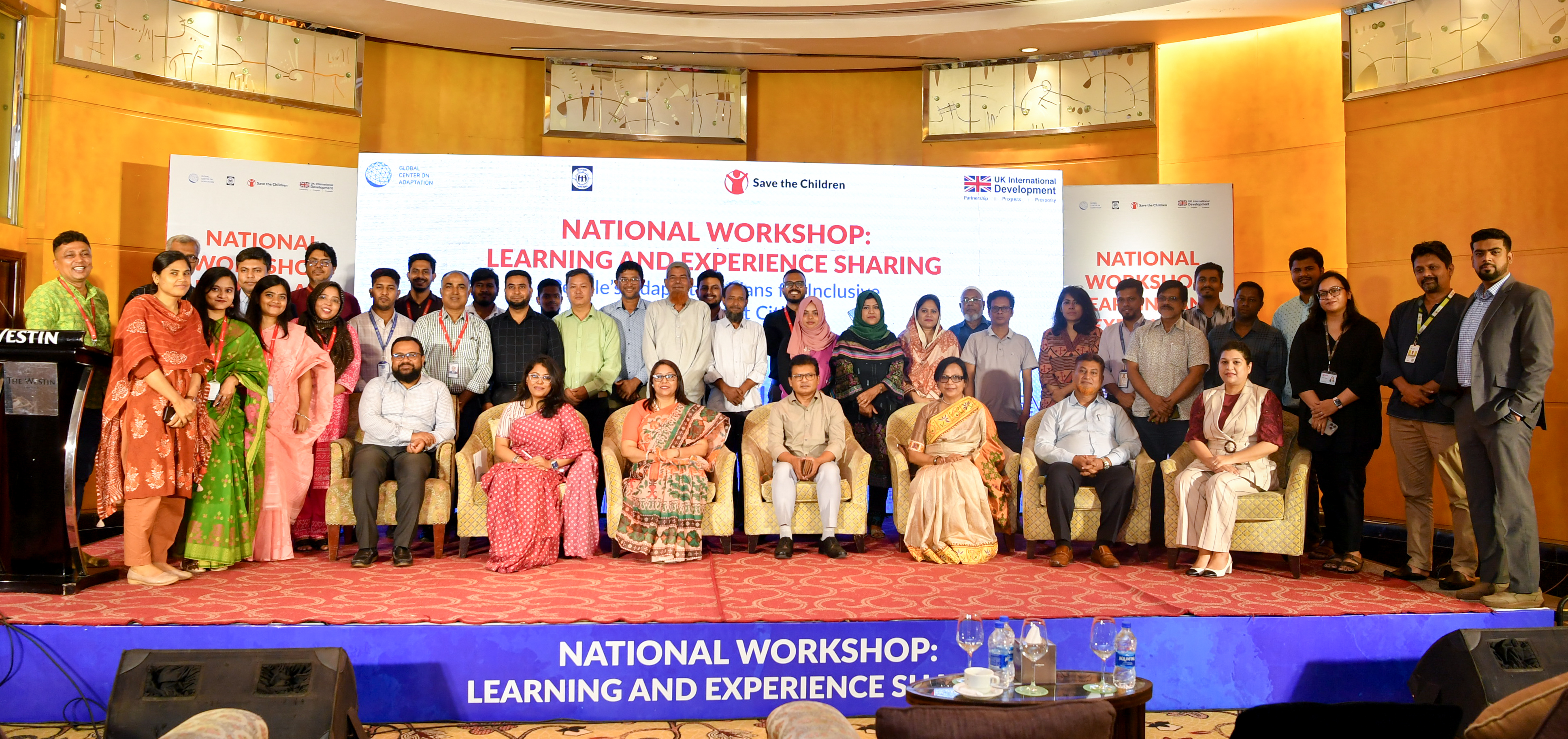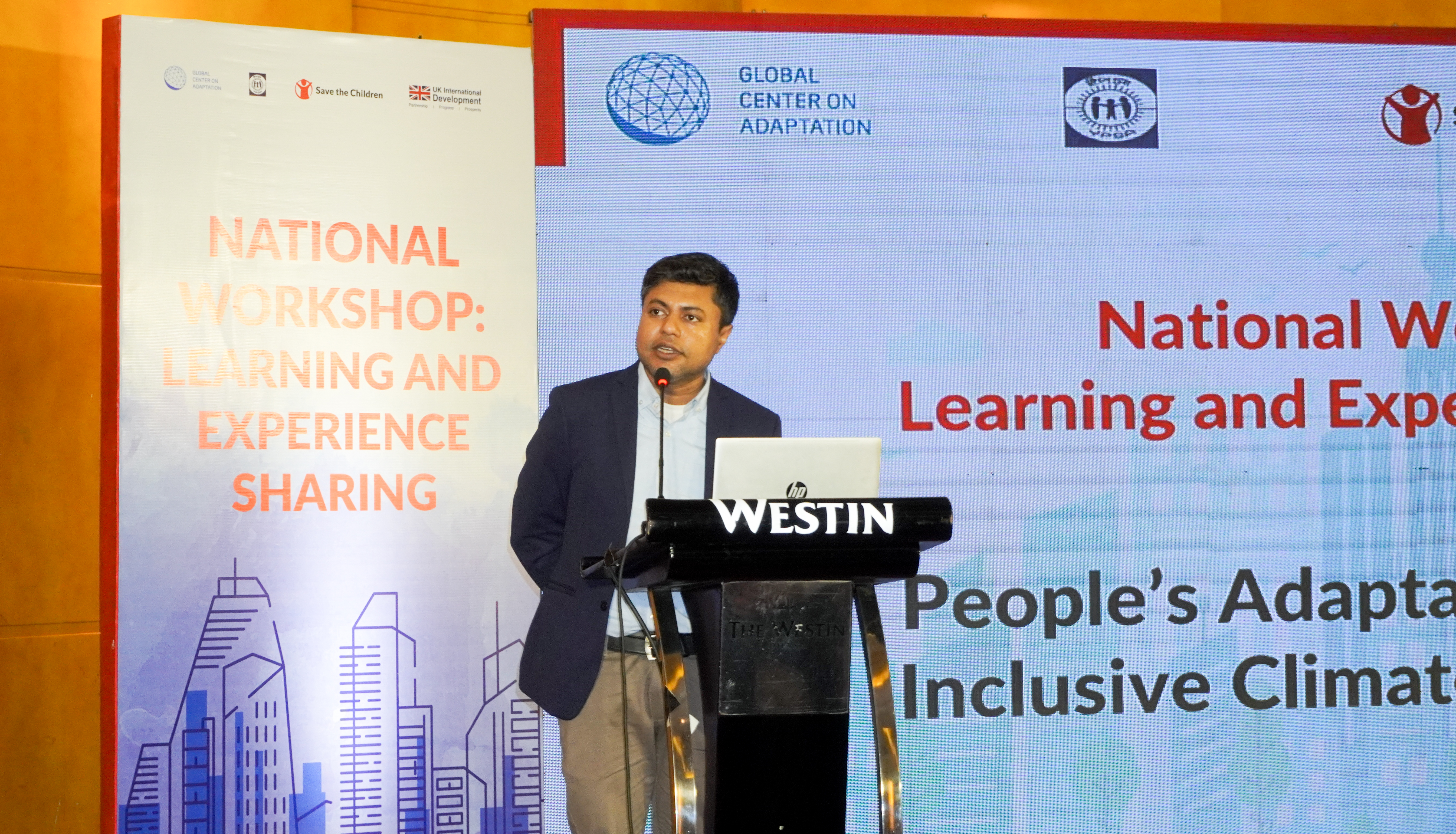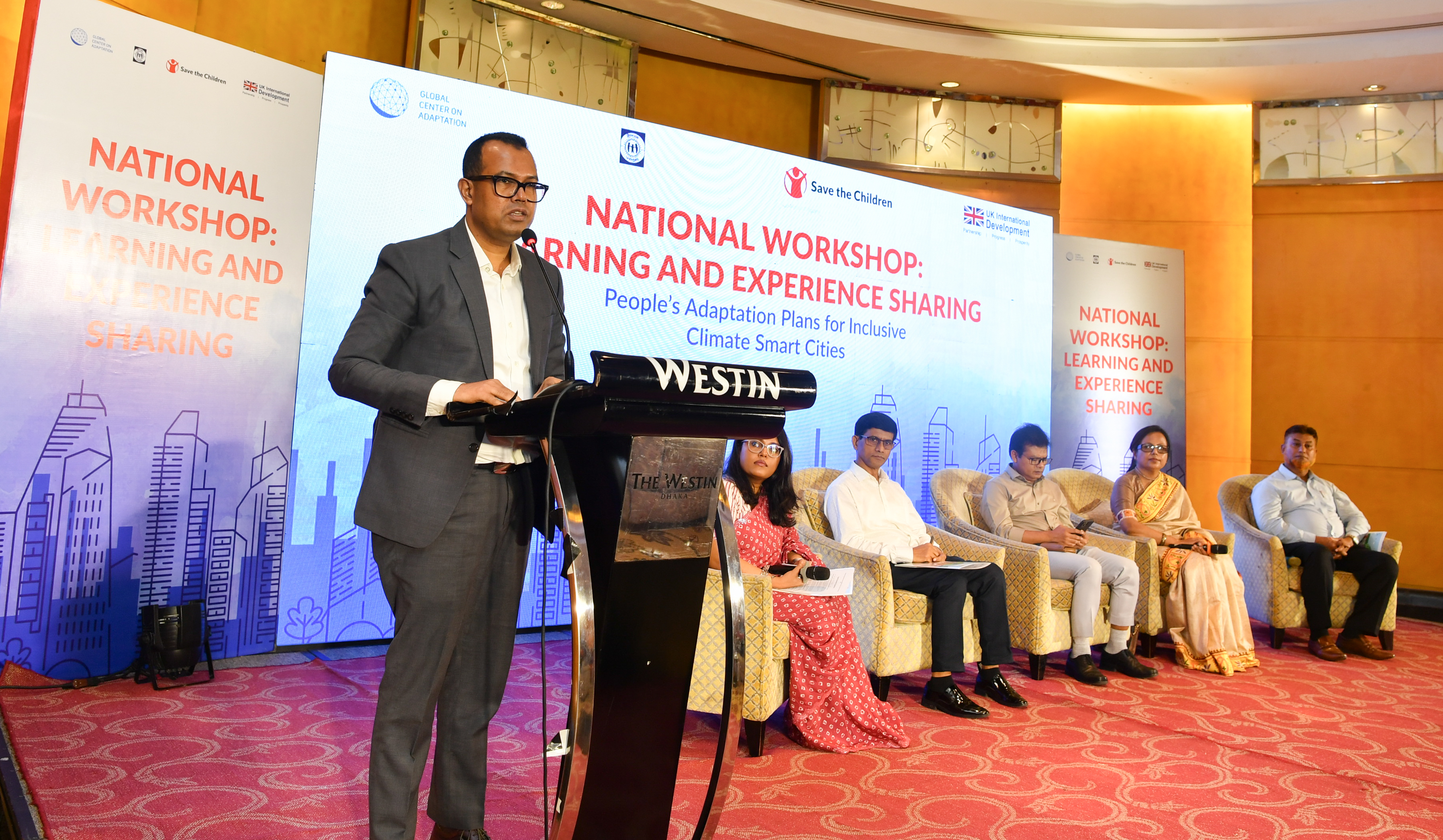
Dhaka, Bangladesh, 21 September, 2025 — The Global Center on Adaptation (GCA), in partnership with Save the Children and Young Power in Social Action, and with support from the Government of the UK, jointly convened a “National Learning and Sharing Workshop on People’s Adaptation Plans for Inclusive Climate-Smart Cities” at The Westin Dhaka. The workshop forms part of GCA’s initiative to develop People’s Adaptation Plans to inform planned investments under the upcoming Bangladesh Smart Cities Development Project (BSCDP) financed by the Asian Infrastructure Investment Bank (AIIB) and to be implemented by the Local Government Engineering Department (LGED).
The workshop brought together government officials, municipalities, development partners, academia, and community representatives to share insights and lessons from a year-long initiative supporting climate-vulnerable low-income communities in three secondary towns to lead the development of their climate action plans. Over the last year, GCA and its partners worked across 27 at-risk low-income communities in Feni, Laksam, and Mirsharai municipalities - three pilot towns under the BSCDP project – and engaged over 6,800 stakeholders including women, children, elderly people, persons with disabilities, community mobilizers, and local government representatives to formulate locally-led People’s Adaptation Plans for each municipality. The plans aim to identify community-informed priority solutions for ensuring climate-smart development in these municipalities, and are responsive to the needs of the poor and vulnerable.
The workshop began with opening remarks from Abdulla Al Mamun, Director of Child Protection and Child Rights Governance at Save the Children, and Rita Lohani, GCA’s Country Representative in Bangladesh. Lohani highlighted GCA’s approach to working with international financial institutions to strengthen climate adaptation in large-scale investments.
“GCA values Locally Led Adaptation because it ensures that communities most at risk are the ones shaping the solutions,” said Lohani. “By linking these community-led priorities to investments by our international financial institution partners such as AIIB and the Asian Development Bank, we help ensure that climate resilience is built into large-scale urban development from the ground up.”

Riadadh Hossain, Program Officer, GCA.
A joint presentation by Riadadh Hossain, Program Officer, GCA; Nasrin Akter, Manager – Resilience and Climate Change Adaptation, Save the Children; and Prof. Md. Mostafizur Rahman, Jahangirnagar University, showcased the People’s Adaptation Planning Process, which began with stakeholder mapping and advisory committee formation, followed by identification of priority low-income communities and recruitment of Community Mobilizers—representatives from the communities themselves who received intensive training on locally led adaptation approaches.
Over 1,500 household surveys were conducted, complemented by GIS-based hazard mapping and geospatial analysis to ground-truth climate risks at the local level. Local Adaptation Committees (LACs) comprising community members were established in all 27 LICs. Through participatory exercises—including transect walks, social and resource mapping, hazard and risk mapping, and livelihood calendars—communities co-created the People’s Adaptation Plans, which were subsequently validated at ward and municipal levels.
The process identified priority interventions for improved drainage, climate-resilient housing, sustainable livelihoods, and inclusive governance mechanisms, while strengthening community capacity to engage effectively with municipal authorities.

During the workshop, community and municipal representatives shared reflections on the process, emphasizing how it empowered them to take climate action and collaborate more closely with local authorities. A representative from the Urban Development Directorate highlighted the importance of aligning the People’s Adaptation Plan with municipal master plans to ensure integration and long-term sustainability.
The workshop also featured a panel discussion moderated by Shahrin Mannan, Senior Program Officer, GCA, focusing on advancing inclusive, climate-smart cities in Bangladesh.
“Adaptation efforts must be backed by baseline studies, clear action plans, and life cycle costing to ensure long-term sustainability. The People’s Adaptation Plans provide a roadmap for integrating community priorities into municipal planning, ensuring BSCDP investments are both effective and sustainable,” said Mohammad Zakir Hossain, Executive Engineer, LGED.
“Many community-based risk reduction plans exist, but few translate into real action. The People’s Plans from this project demonstrate how evidence-based local planning, coupled with municipal engagement, can create measurable outcomes,” stated Netai Dey Sarker, Director, Department of Disaster Management.
Dr. Ishrat Islam, Professor, Bangladesh University of Engineering and Technology emphasized that while the People’s Plans are strong planning tools, their impact depends on behavior change within communities.
“The Plans provide a solid foundation, but their true value is realized only when communities are motivated and equipped to take action themselves,” noted Dr. Islam. “This project has helped instill that sense of agency, encouraging residents to own solutions and drive adaptation locally.”

A B M Feroz Ahmed, Livelihoods Adviser, British High Commission Bangladesh.
The workshop concluded with remarks from A B M Feroz Ahmed, Livelihoods Adviser, British High Commission Bangladesh, who stressed the need for context-specific, replicable adaptation models to strengthen resilience through government systems.
Looking ahead, the People’s Adaptation Plans are expected to directly inform planned investments in the three municipalities under the BSCDP project. Local Adaptation Committees and trained Community Mobilizers are now equipped to:
Lead future planning
Map climate challenges
Identify priority solutions
Engage authorities for implementation
Steps have been initiated to integrate solutions identified in the People’s Adaptation Plan into annual Municipal Development Plans, ensuring institutional ownership. Municipalities have pledged continued collaboration with community mobilizers to advance locally led adaptation and use the plans as reference documents for securing additional funding in the future.
By centering vulnerable communities and linking their priorities to large-scale investments, this initiative demonstrates a pathway for advancing Bangladesh’s Smart Cities agenda while ensuring that no one is left behind.